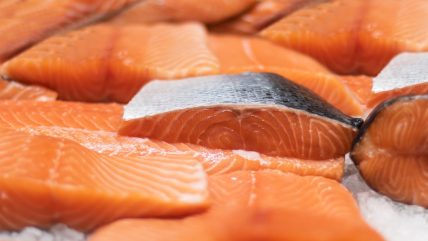
Norway has announced its controversial plan to introduce an acquaculture tax of 40% on the profits of salmon and trout farmers has been scaled back.
The updated proposal is for a 35% resource rent tax on seafood company profits.

Discover B2B Marketing That Performs
Combine business intelligence and editorial excellence to reach engaged professionals across 36 leading media platforms.
That would mean the country’s seafood majors, such as Mowi and SalMar, would face an overall tax burden of 57%, including corporate tax.
The planned measure has faced concerted criticism from much of Norway’s seafood industry.
Presenting the bill for the introduction of the measure yesterday (28 March), the Norwegian government, which announced the plan last autumn, stuck to its line that the tax will “ensure that local communities along the coast and society as a whole receive a greater share of the value that is created by the fish farming industry”.
The bill – which still has to be approved by the Norwegian Parliament – would see the tax paid retrospectively back to 1 January this year.

US Tariffs are shifting - will you react or anticipate?
Don’t let policy changes catch you off guard. Stay proactive with real-time data and expert analysis.
By GlobalDataPrime Minister Jonas Gahr Støre said: “We have a long tradition in Norway in which value that is created from using our common natural resources shall benefit society as a whole. Access to our common natural resources has enabled this industry to generate particularly high earnings. All of us should be able to derive greater benefit from the significant value that is created. It is now the time to introduce a resource rent tax for the aquaculture industry.”
He said a similar resource rent tax on petroleum has “played an essential role in building up the Government Pension Fund of Norway”.
Under its proposals, the tax payable would be based on the market value when fish are removed from the pen, which the companies themselves will set for 2023. From 2024, the plan is to establish an independent price board.
Støre said the government has “listened to the submissions from the consultation process and “has placed particular emphasis on the arrangement ensuring continued growth”.
Local seafood heavyweight Mowi acknowledged the introduction of the bill and lower tax rate attached to it.
It said: “The proposal is not very different to the original proposal, however, the resource rent tax rate is reduced from 40% to 35%.”
When the proposal was announced last year, fish farming stock prices were hit and several seafood companies – including Cermaq, Mowi and Lerøy Seafood Group – said they were pulling back on investment plans in the country.
Last month, after the company said it was cutting 435 jobs in a cost-saving exercise dating back to 2018, Mowi CEO Ivan Vindheim reiterated his opposition to the tax and warned of the “peril” that could ensue for the industry.
In November, seafood peer SalMar blamed the tax plan for mass redundancies.
Announcing plans to make 851 employees jobless, SalMar said the scale of these redundancies is “mainly because the government’s proposal for a new salmon tax has destroyed the market for long-term fixed-price contracts”. The company said such contracts are usually entered into well in advance of deliveries and are “absolutely necessary” for providing the plants with enough processing activity.
Lerøy Seafood Group, also speaking late last year, said the tax proposal was having a “severely negative impact on its day-to-day operations and would have serious long-term consequences for Lerøy and the industry”.



